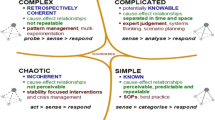Abstract
The aim of the paper is to assess the features of public policy in a complex environment. The point of departure is provided by a number of recent papers by David Colander where he argues that progress in mathematics and computational technology allows scholars and policymakers to grasp features of economic reality that, up to some time ago, were beyond their reach. Since the technical difficulties associated to these new tools hardly allow single individuals to use them, Colander suggests that there is scope for public intervention. This intervention need not preclude individual freedom. He refers to it as “libertarian paternalism”. The paper argues that Colander focuses on first order complexity, which is associated to economic dynamics, but neglects second order complexity, which relates to cognitive processes. Cognition implies that actors can formulate their choices only by learning, i.e. by constructing appropriate knowledge contexts. This requires appropriate public action in order to prevent the establishment of restrictive knowledge contexts. In turn, this implies a “democratic paternalism” that is markedly different from the paternalism Colander refers to.
Access this chapter
Tax calculation will be finalised at checkout
Purchases are for personal use only
Preview
Unable to display preview. Download preview PDF.
Similar content being viewed by others
References
Brock, W. A., Colander, D., 2000, Complexity and Policy, The Complexity Vision and the Teaching of Economics, Elgar, Cheltenham.
Coase, R. H., 1988, The problem of social cost, in: The Firm, the Market, and the Law, Chicago University Press, Chicago.
Colander, D., 2003a, Muddling Through and Policy Analysis, Middlebury College Economics Discussion Paper, No. 03-17.
Colander, D., 2003b, The Complexity Revolution and the Future of Economics, Middlebury College Economics Discussion Paper, No. 03-19.
Colander, D., Holt, R., and Rosser, B., 2003, The Changing Face of Mainstream Economics, Middlebury College Economics Discussion Paper, No. 03-27.
Delorme, R., 1998, From First Order to Second Order Complexity in Economic Theorising, Mimeo.
Egidi, M., 1992, Organizational learning, problem solving and the division of labour, in: Economics, Bounded Rationality and the Cognitive Revolution, M. Egidi and R. Marris, eds., Elgar, Aldershot.
Georgescu-Roegen, N., 1976, Process in farming versus process in manufacturing: a problem of balanced development, in: Energy and Economic Myths. Institutional and Analytical Economic Essays, Pergamon Press, New York.
Hirschman, A. O., 1984, Against parsimony: three easy ways of complicating some categories of economic discourse, The American Economic Review 74:89–97.
Kapp, K. W., 1976, The open-system character of the economy and its implications, in: Economics in the Future: Towards a New Paradigm, K. Dopfer, ed., Macmillan, London.
Latsis, S. J., 1976, A research program in economics, in: Method and Appraisal in Economics, S. J. Latsis, ed., Cambridge University Press, Cambridge.
March, J. G., and Simon, H. A., 1958, Organizations, John Wiley and Sons, New York.
North, D. C., 1990, Institutions, Institutional Change and Economic Performance, Cambridge University Press, Cambridge.
Polanyi, M., 1962, Personal Knowledge. Towards a Post-Critical Philosophy, Routledge, London.
Ramazzotti, P., (forthcoming), Constitutive rules and strategic behavior in: Institutions in Economics and Sociology: Variety, Dialogue and Future Challenges, K. Nielsen and C.A. Koch, eds., Elgar, Cheltenham.
Rosser, J. B, Jr., 1999, On the complexities of complex economic dynamics, Journal of Economic Perspectives 13:169–192.
Sen, A., 1999, Development as Freedom, Alfred Knopf, New York.
Simon, H. A., 1978, Rationality as process and as product of thought, in: Decision Making. Descriptive, Normative and Prescriptive Interactions, D. E. Bell, H. Raiffa, and A. Tversky, eds., Cambridge University Press, Cambridge.
Simon, H. A., 1981, The architecture of complexity, in: The Sciences of the Artificial, MIT Press, Cambridge, MA.
Thaler, R. H., and Sunstein, C. R., 2003, Behavioral economics, public policy, and paternalism, The American Economic Review (May):175–179.
Author information
Authors and Affiliations
Editor information
Editors and Affiliations
Rights and permissions
Copyright information
© 2006 Springer Science+Business Media, Inc.
About this paper
Cite this paper
Ramazzotti, P. (2006). Complexity and Paternalism. In: Minati, G., Pessa, E., Abram, M. (eds) Systemics of Emergence: Research and Development. Springer, Boston, MA. https://doi.org/10.1007/0-387-28898-8_15
Download citation
DOI: https://doi.org/10.1007/0-387-28898-8_15
Publisher Name: Springer, Boston, MA
Print ISBN: 978-0-387-28899-4
Online ISBN: 978-0-387-28898-7
eBook Packages: Business and EconomicsBusiness and Management (R0)




